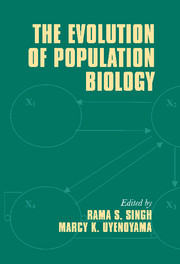Book contents
- Frontmatter
- Contents
- List of contributors
- Publications of R. C. Lewontin
- Preface
- Introduction
- Part I Historical foundations and perspectives
- Part II Genotypes to phenotypes: new genetic and bioinformatic advances
- Part III Phenotypes to fitness: genetics and ecology of populations
- Part IV Genes, organisms, and environment: evolutionary case studies
- Part V Applied population biology: biodiversity and food, disease, and health
- 17 Conservation biology: the impact of population biology and a current perspective
- 18 The emergence of modern human mortality patterns
- 19 Units of selection and the evolution of virulence
- 20 Evolutionary genetics and emergence of RNA virus diseases
- 21 A scientific adventure: a fifty years study of human evolution
- 22 Geneticists and the biology of race, 1900–1924
- Index
22 - Geneticists and the biology of race, 1900–1924
Published online by Cambridge University Press: 08 January 2010
- Frontmatter
- Contents
- List of contributors
- Publications of R. C. Lewontin
- Preface
- Introduction
- Part I Historical foundations and perspectives
- Part II Genotypes to phenotypes: new genetic and bioinformatic advances
- Part III Phenotypes to fitness: genetics and ecology of populations
- Part IV Genes, organisms, and environment: evolutionary case studies
- Part V Applied population biology: biodiversity and food, disease, and health
- 17 Conservation biology: the impact of population biology and a current perspective
- 18 The emergence of modern human mortality patterns
- 19 Units of selection and the evolution of virulence
- 20 Evolutionary genetics and emergence of RNA virus diseases
- 21 A scientific adventure: a fifty years study of human evolution
- 22 Geneticists and the biology of race, 1900–1924
- Index
Summary
Attitudes about the kind and amount of genetic variation in populations, like all attitudes about unresolved scientific issues, reflect and are consistent with the intellectual histories of their proponents. People see the new problems mirrored in a glass that has been molded by their solutions to old problems. A scientist's present view of difficult questions is chiefly influenced by the history of his intellectual and ideological development up to the present moment, and the resolution of current difficulties will in turn precondition his view of future problems.
(Lewontin 1974, p. 29)Introduction
The rediscovery of Mendel's theory of heredity in 1900 started the century of genetics. In the first quarter of the century, the new science was applied to many social questions, especially eugenics and the subject of this chapter, human race differences and race crossing.
Who would have guessed that a study of hybridization in peas could have such wide ramifications? Rediscovered by three men in 1900, Mendel's theory revolutionized the study of heredity and evolution within 15 years. Many of the long-standing puzzles and contradictions in the evidence about heredity and hybridization yielded to Mendelian analysis.
- Type
- Chapter
- Information
- The Evolution of Population Biology , pp. 428 - 448Publisher: Cambridge University PressPrint publication year: 2004



